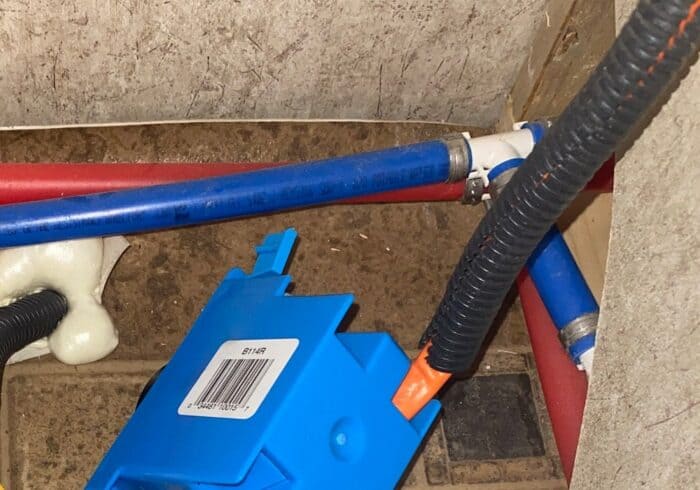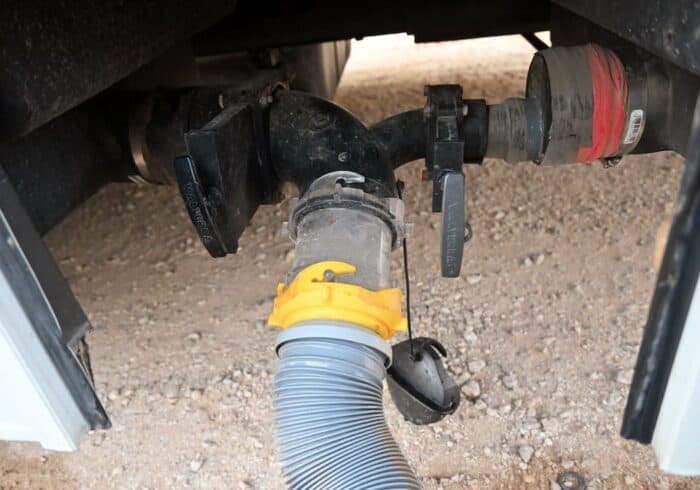Can Antifreeze Get Rid of Ice in RV Pipes?
If you’ve had the unfortunate experience of water or drainage pipes freezing in your RV, you might be wondering if antifreeze might help thaw the ice.
Unfortunately, antifreeze only stops ice from forming, it will not get rid of ice in already in the RV pipes.
Related Product: Use adhesive Tank Heater Pads by RecPro (click to view on Amazon) to keep the RV black, grey, and freshwater tanks from freezing.
One thing RV antifreeze can do is help stop the water that’s already frozen from freezing again once it’s melted.
But hopefully, you’ll be able to get all the ice and water out of your RV’s water or drainage system before it has time to freeze again.
See Also: How Cold Can It Get Before I Need To Winterize My RV?
Best Way to Thaw a Frozen RV Freshwater System
Most RVs use PEX pipes for the freshwater system. PEX pipes are a little flexible and can expand a little bit without breaking or cracking.
So even if a part of the pipe is frozen, it might not break if you get it taken care of quickly enough.
Since RV water pipes are so small and closer to the outside of the RV, it’s very common for them to freeze when temperatures start to dip below freezing.

If one of the hot or cold water pipes has frozen somewhere down the line, you need to start doing something about it right away.
Turn on the RV furnace and open all of the cabinets to get some heat on the pipes.
The freshwater pipes are going to be behind cabinets, under dinette seats, and even behind the sofa.
You want to try an expose as many RV water pipes as possible to warm them up with heat from the furnace.
Hopefully, your RV water heater is already on. If not, check it to make sure it’s not frozen as well.
If an RV water heater freezes when it’s full of water it will crack and start leaking, so make sure it’s not frozen as well.
Open all of the taps to let out any water that’s not frozen. Sometimes just the cold water pipes will freeze and not the hot water ones.
You should also remove the screens and oxygenators on the taps to open up a path for ice to come out.
See Also: How Long Will An RV Battery Run The Furnace? + Calculations
Try and find the area of pipe that’s the most frozen first. Usually, it’s a spot that’s closest to the outside.
On our travel trailer, the connection to the freshwater tank underneath was always the first to freeze.
If you’re connected to city water make sure the freshwater hose isn’t frozen as well.
Also, check the pipes directly behind the city water connection if you can. That area is always close to the outside of the RV and the last spot to get any heat from the inside.
Use a hair dryer to concentrate heat on the frozen spots. You don’t want to use anything too powerful like a heat gun because it could melt the pipe plastic.
Now it’s just a waiting game.
Your RV furnace should help keep things from freezing even more, and the hair dryer should be loosening up the ice inside the pipes.
If the entire system is frozen it will take a while for everything to thaw and for water to start flowing again.
How to Thaw a Frozen RV Drainage & Sewage System
Frozen P-Trap
It’s very uncommon for the drain pipes in an RV to freeze since most of the water drains into the black or grey tank and the pipes are left empty.
The one thing that might freeze is the P-trap underneath the kitchen or bathroom sink. RVs don’t always have traps in the drain pipes but sometimes they do.
The small amount of water in the trap might have frozen and that could be why no water is draining from the sink.
Thaw that area with a blow dryer as well. It shouldn’t take long to get water draining into the holding tanks again.
See Also: Best Heated Water Hoses For RV Campers, Barns & Livestock
Frozen Black & Grey Tank
Usually, the best thing to do when you know temperatures are going to drop below freezing at night is to empty the black and grey tank completely and add a little antifreeze to keep the valves from freezing.
But emptying the holding tanks isn’t always an option.
If that’s the case you should make sure both the black and grey are over 1/2 full.
It takes longer to freeze a tank that’s 1/2 full than it takes to freeze a tank that’s only 1/4 full.
Most of the time the areas that freeze first are underneath the tank and the gate valve pipes.
It might just be the gate valves that are frozen shut and not the entire black or grey tank.
See Also: Best Heated RV Sewer Hose Review For Winter RV Camping

If you have heat cable you can wrap it around the gate valves and pipes around them to get that spot thawing.
A hair dryer also works if that’s all you have.
If you have a space heater putting that underneath the tanks is a good way to start heating that area.
If you’re boondocking a propane heater will also work. Just make sure there’s plenty of ventilation and don’t put it directly underneath the tanks because the plastic could melt.
If you can insulate the area around the tanks with old blankets or camping gear it will help keep the heat concentrated on the tanks so they thaw faster.
Conclusion About Thawing Frozen RV Pipes
Using moderate heat to slowly thaw frozen RV pipes is key to preventing more damage.
Too hot too fast could result in cracked or weakened pipes which becomes an entirely new issue.
Warming up the entire RV and using a hair dryer to direct heat to specific areas is your best bet for thawing frozen RV pipes safely.
See Also: 6 Best Diesel Heaters For Campers, RVs & Vans
Once you’ve gotten all of the ice out make sure you run water through all of the pipes and faucets.
Check every pipe and connection carefully to make sure nothing has cracked or is leaking.
If you’re lucky the PEX piping didn’t freeze enough to break, but sometimes joints and connectors aren’t so forgiving.
If you have any more questions about RV antifreeze or thawing frozen RV pipes, leave a comment below.

